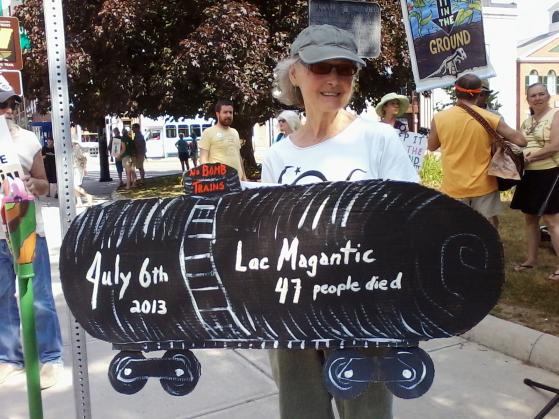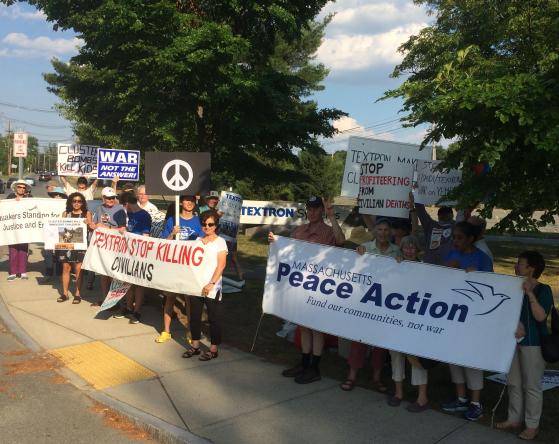These photos show rallies for peace and the environment. The first photo was taken in Greenfield on July 6. It shows Linda Owen of Brattleboro. Her sign refers to the Canadian town of Lac-Mégantic where three years ago a freight train carrying crude oil derailed and exploded, killing 47 people. Similar trains travel through Greenfield, said rally organizer Tim Stevenson of the group Post Oil Solutions www.PostOilSolutions.org.
“There have been 14 major oil train fires in three years,” he said. “More than 25 million Americans live in a blast zone, and of those, 60 percent are people of color. The fracked shale oil and tar sands being transported by these trains is the dirtiest, most polluting oil in the country.” About 20 people attended the rally. People held signs saying, “Leave Fossil Fuels in the Ground” and “Yes to Solar and Conservation.”
The oil is used mainly to make gas for cars and trucks, and to heat buildings. These uses of oil cause climate change, which the world's leading scientists say is a major threat to earth's ability to support human life.
To enlarge a photo, click on it, then scroll down and click “see full-size image.”
Greenfield photo by Sherry Maher
The second photo was taken on July 6 in Wilmington, Massachusetts. It shows a rally outside a bomb factory. The rally was organized by Massachusetts Peace Action www.MassPeaceAction.org. About 30 people attended the rally.
Wilmington photo courtesy of Massachusetts Peace Action
Meanwhile, in Burlington, Vermont, activists are working to stop a multi-million dollar war project from going ahead. They have a web site at www.StopTheF35.com and can also be reached via www.DumontLawVT.com.
Almost half (44 percent) of this year's entire federal budget of about $3 trillion is being spent on war. That’s according to:
www.WarResisters.org/FederalPieChart
Here are the voting records of local members of Congress for 2013, the most recent year for which records were available, from Peace Action.
100 is best, zero is worst.
The Pioneer Valley of Massachusetts:
Edward Markey 100
James McGovern 97
Richard Neal 83
Elizabeth Warren 75
Brattleboro:
Patrick Leahy 75
Bernie Sanders 75
Peter Welch 91
Keene:
Kelly Ayotte zero
Ann Kuster 65
Jeanne Shaheen 75
John Ungerleider is a professor of Peacebuilding and Conflict Transformation at the School for International Training in Brattleboro. “The military budget is so high mainly because members of Congress want to keep defense jobs in their districts,” he told the Valley Post. Asked if the USA would be more likely to be attacked if the military budget was cut by 50 percent, Ungerleider said, “Of course not.” The best way for people to get the government to cut military spending is to donate to, and/or volunteer for, a group like the American Friends Service Committee www.afsc.org, he said.
Melvin Goodman is a professor at Johns Hopkins University. For a decade he worked at the CIA as a division chief and foreign policy analyst. New Yorker magazine writer Seymour Hersh said of Goodman’s 2013 book, National Insecurity, “Goodman is not only telling us how to save wasted billions, he is telling us how to save ourselves.”
In the book, Goodman writes, “The United States has the most secure geopolitical environment of any major nation, but sustains a defense budget that equals the combined budgets of the rest of the world…. We have more than 700 military bases and facilities around the world; few other countries have any. We can deploy 11 aircraft carriers; among our rivals only China plans to deploy one—and that is a revamped Ukrainian aircraft carrier, a carryover from the ancient Soviet inventory…. Since the end of World War II, the United States has fought inconclusive wars in Korea, Vietnam, Iraq, and Afghanistan; conducted dubious invasions of Cambodia, Lebanon, Grenada, and Panama; and mounted counterproductive covert operations around the world, including those in the Congo, Chile [which resulted in the installation of dictator Augusto Pinochet, who tortured and killed thousands of his political opponents], El Salvador, and Guatemala. Only Desert Storm in Iraq in 1991 can be termed a success, although it left Saddam Hussein in power and President George H.W. Bush out of power the following year, setting the stage for George W. Bush’s use of force against Iraq two decades later.”
David King is the United Kingdom's Special Representative for Climate Change. "The Iraq war was just the first of this century's 'resource wars,' in which powerful countries use force to secure valuable commodities," King told the Guardian newspaper.
The USA and other rich nations have a long history of stealing resources from Africa. This story is told in the books “Bury the Chains” by Adam Hochschild and "Private Empire: ExxonMobil and American Power" by Steve Coll, and in the film "Lumumba" by Raoul Peck. The average life expectancy in the African nation of Sierra Leone is 45. In the USA, it’s 79.


Post new comment